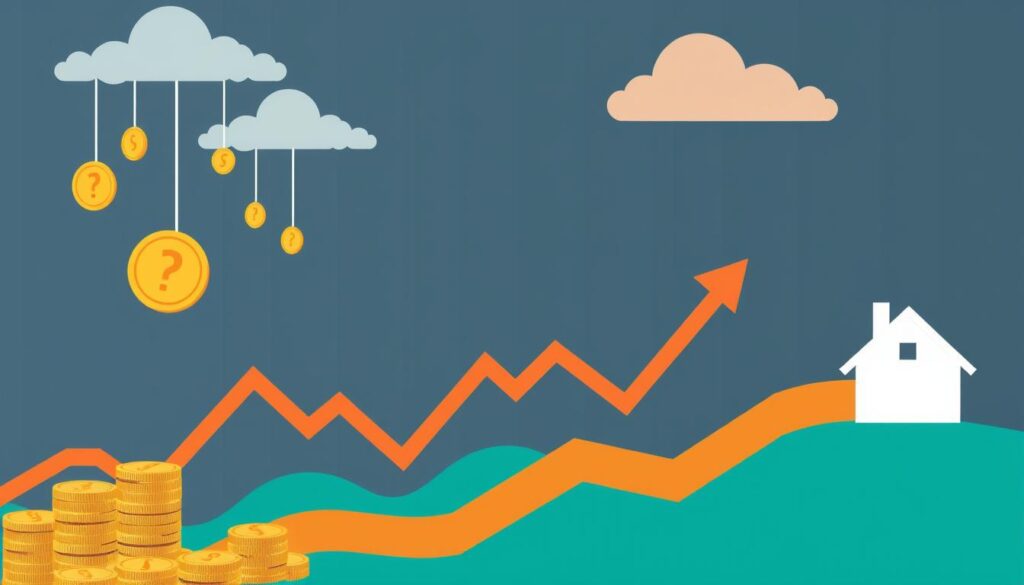As a first-time homebuyer with bad credit, you may think that getting a mortgage is impossible. However, it’s possible to get a mortgage with a credit score as low as 500, depending on the type of loan. A bad credit mortgage can be a viable option for those who are struggling to get approved for a traditional loan. For first-time homebuyers, understanding the process and options available is crucial in securing a bad credit mortgage.
Majority of lenders look at your FICO Scores to evaluate creditworthiness, with a good credit score being above 670. But, with a credit score at least 500, you could qualify for a government-backed FHA loan with a 10% down payment. This makes it possible for first-time homebuyers to get a mortgage with bad credit, although it may require a larger down payment or come with less favorable terms.
Getting a mortgage with bad credit requires careful planning and consideration of your financial situation. As a first-time homebuyer, it’s essential to understand the options available and the steps you can take to improve your chances of getting approved for a bad credit mortgage. In this guide, we’ll explore the possibilities and challenges of obtaining a mortgage with bad credit, providing you with the information you need to make informed decisions.
Table of Contents
Key Takeaways
- It’s possible to get a mortgage with a credit score as low as 500, depending on the type of loan.
- A bad credit mortgage can be a viable option for first-time homebuyers who are struggling to get approved for a traditional loan.
- Understanding your credit score and the options available is crucial in securing a bad credit mortgage.
- First-time homebuyers may need to consider a larger down payment or less favorable terms to get approved for a bad credit mortgage.
- Improving your credit score can enhance your chances of getting approved for a mortgage with better terms.
- Exploring government-backed loan options, such as FHA loans, can provide more flexible credit score requirements for first-time homebuyers.
Understanding What Qualifies as Bad Credit
When it comes to mortgage applications, credit score ranges play a significant role in determining eligibility. Credit scores are typically categorized into several ranges, including excellent, very good, good, fair, and poor. Understanding these credit score ranges is essential for first-time buyers to navigate the mortgage application process.
A credit score below 580 is generally considered poor, while a score between 580-669 is considered fair. These credit score ranges can significantly impact mortgage credit requirements, including interest rates and loan terms. For instance, a credit score between 760 and 850 can result in an APR of 7.11% for a 30-year fixed mortgage loan, while a score between 700 and 759 can result in an APR of 7.36%.
Credit Score Ranges Explained
The following are the typical credit score ranges and their implications on mortgage eligibility:
- 800 – 850: Excellent credit level
- 740 – 799: Very good credit level
- 670 – 739: Good credit level
- 580 – 669: Fair credit level
Common Credit Issues for First-Time Buyers
First-time buyers often face common credit issues, such as limited credit history or past financial mistakes. These issues can negatively impact their credit scores, making it challenging to secure a mortgage. However, there are strategies to improve credit scores, such as reducing debt, paying bills on time, and monitoring credit reports.
Impact of Credit Scores on Mortgage Applications
Credit scores have a significant impact on mortgage applications, including mortgage credit requirements. A good credit score can result in better interest rates, lower monthly payments, and more favorable loan terms. On the other hand, a poor credit score can lead to higher interest rates, higher monthly payments, and stricter loan terms. Understanding the impact of credit scores on mortgage applications is crucial for first-time buyers to make informed decisions about their mortgage options.
| Credit Score Range | APR | Monthly Mortgage Payments | Total Interest Paid |
|---|---|---|---|
| 760-850 | 7.11% | $2,549 | $517,767 |
| 700-759 | 7.36% | $2,556 | $520,144 |
Assessing Your Current Financial Situation
When it comes to getting a mortgage, lenders consider factors beyond credit scores, including debt-to-income ratio and savings. A thorough financial assessment is essential to determine your mortgage readiness. This involves evaluating your income, expenses, savings, and debt to get a clear picture of your financial health.
To start, you’ll need to calculate your debt-to-income ratio, which should be under 43% for most lenders. You can use the “28/36 rule” as a guideline, where you shouldn’t spend more than 28% of your income on a mortgage and no more than 36% on a mortgage plus other debt. Additionally, keeping your credit utilization rate under 30% is recommended.
Here are some key factors to consider during your financial assessment:
- Income: Calculate your total monthly income from all sources.
- Expenses: List all your monthly expenses, including debt payments, utilities, and living costs.
- Savings: Determine how much you have saved for a down payment and closing costs.
- Debt: Calculate your total debt, including credit cards, loans, and other obligations.
By conducting a thorough financial assessment, you’ll be better equipped to determine your mortgage readiness and make informed decisions about your path to homeownership.
Steps to Improve Your Credit Before Applying
Improving your credit score can significantly enhance your chances of getting a mortgage. Credit improvement is a process that requires patience, discipline, and the right strategies. One of the first steps is to obtain and review your credit reports, identifying any credit report errors that may be negatively impacting your score.
To start the credit improvement process, you should check your credit reports from the three major credit bureaus: Equifax, Experian, and TransUnion. Look for any errors or inaccuracies, such as incorrect addresses, accounts that are not yours, or accounts that have been closed. Disputing credit report errors can help improve your credit score over time.
Reducing existing debt is another crucial step in credit improvement. Focus on paying down revolving debt, such as credit card balances, and make on-time payments to demonstrate responsible credit behavior. Building a positive credit history takes time, but it can significantly improve your chances of getting a mortgage with a favorable interest rate.
| Credit Score | Interest Rate |
|---|---|
| 700-850 | 3.5%-4.5% |
| 600-699 | 4.5%-5.5% |
| 500-599 | 5.5%-6.5% |
By following these steps and maintaining good credit habits, you can improve your credit score and increase your chances of getting a mortgage. Remember, credit improvement is a long-term process, and it’s essential to be patient and persistent in your efforts.
How to Get a Mortgage with Bad Credit: Your Complete Guide
When it comes to bad credit mortgage options, there are several types of mortgages available for buyers with lower credit scores. These include FHA, VA, and some conventional loans. Understanding the mortgage application process is crucial to navigating the various options and finding the best fit for your financial situation.
A key factor in the mortgage application process is your credit score. While a minimum credit score of 620 is often required for a conventional loan, there are bad credit mortgage options available for those with lower scores. For example, FHA loans may allow a down payment as low as 3.5% for credit scores of at least 580.
- FHA loans, which offer more lenient credit score requirements
- VA loans, which allow zero down payment for military-affiliated individuals
- USDA loans, which have no down payment requirement for lower-income borrowers living outside urban areas
By understanding the mortgage application process and exploring the various bad credit mortgage options available, you can make informed decisions and find the best fit for your financial situation. Remember to also consider factors such as debt-to-income ratio, employment history, and down payment amount when reviewing mortgage applications.
Saving for a Larger Down Payment
A larger down payment can significantly impact your mortgage application, especially if you have bad credit. By saving for a bigger down payment, you can potentially offset the effects of a low credit score and qualify for better loan terms.
For instance, a mortgage down payment of 20% can help you avoid paying private mortgage insurance (PMI), which can save you hundreds of dollars per year. Additionally, a larger down payment can lead to lower monthly payments and reduced interest rates.
Benefits of Bigger Down Payments
Some benefits of bigger down payments include:
- Lower monthly payments
- Reduced interest rates
- No PMI required
- More negotiating power with lenders
Down Payment Assistance Programs
Down payment assistance programs can help you cover the costs of a down payment. These programs are often available to first-time homebuyers and can provide thousands of dollars in assistance. Some popular down payment assistance programs include FHA loans and USDA loans.
Creating a Savings Strategy
To create a savings strategy, start by setting a goal for your down payment and creating a timeline for achieving it. You can then break down your goal into smaller, manageable steps, such as setting aside a certain amount each month. Consider automating your savings by setting up automatic transfers from your checking account to your savings account.
| Down Payment Percentage | Benefits |
|---|---|
| 20% | No PMI required, lower monthly payments |
| 10% | Lower monthly payments, reduced interest rates |
| 5% | Lower monthly payments, down payment assistance programs available |
Government-Backed Mortgage Options
For individuals with less-than-perfect credit, government-backed mortgage options can be a viable path to homeownership. FHA loans, VA loans, and USDA loans are designed to make home buying more accessible, with more lenient credit criteria and lower down payment requirements.
These government-backed mortgages offer distinct benefits, including:
- Lower down payments: FHA loans require as little as 3.5% down, while VA loans and USDA loans often require no down payment at all.
- More flexible credit scores: FHA loans can be obtained with credit scores as low as 580, while VA loans and USDA loans have more flexible credit requirements.
- Competitive interest rates: Government-backed mortgages often offer lower interest rates compared to conventional loans.
Here is a comparison of the key features of these government-backed mortgage options:
| Loan Type | Down Payment | Credit Score Requirement | Interest Rate |
|---|---|---|---|
| FHA loans | 3.5% – 10% | 580 – 500 | Competitive |
| VA loans | No down payment | No set requirement | Lower interest rates |
| USDA loans | No down payment | No set requirement | Competitive |
While these government-backed mortgage options can be beneficial, it’s essential to carefully review the eligibility requirements and potential drawbacks before making a decision.
Finding the Right Mortgage Lender
When dealing with bad credit, it’s essential to find a mortgage lender that understands your situation and can offer you the best possible deal. Some lenders specialize in working with borrowers who have lower credit scores, known as bad credit lenders. These lenders may offer more flexible terms and higher approval rates, but it’s crucial to do your research and compare rates from multiple lenders.
Traditional banks may have stricter requirements and higher interest rates for borrowers with bad credit. On the other hand, specialty lenders, such as mortgage lenders that cater to borrowers with bad credit, may offer more competitive rates and terms. It’s essential to weigh the pros and cons of each option and consider factors such as interest rates, fees, and repayment terms.
Questions to Ask Potential Lenders
- What are the minimum credit score requirements for your loans?
- What are the interest rates and fees associated with your loans?
- What are the repayment terms, and are there any prepayment penalties?
- Do you offer any assistance programs or resources for borrowers with bad credit?
By asking the right questions and doing your research, you can find a mortgage lender that meets your needs and helps you achieve your goal of homeownership, even with bad credit. Consider working with reputable mortgage lenders that have experience working with borrowers with bad credit, and always read reviews and check ratings before making a decision.
Required Documentation for Your Application
When applying for a mortgage, it’s essential to have all the necessary mortgage application documents ready. This typically includes proof of income, tax returns, bank statements, and explanations for any negative items on credit reports. Lenders require these documents to assess your creditworthiness and ability to repay the loan.
A list of commonly required documents includes:
- Pay stubs and W2 forms for income verification
- Bank statements to confirm savings and assets
- Tax returns to verify income consistency
- Credit reports to evaluate credit history
- Identification documents, such as a driver’s license or passport
Additionally, you may need to provide documentation for any additional income sources, such as investments or rental properties. It’s also important to have a clear understanding of your debt-to-income ratio, as lenders use this to determine your ability to manage additional debt. You can learn more about the mortgage application process and required documents by visiting mortgage application resources.
By gathering all the necessary documents and understanding the requirements, you can ensure a smooth and efficient mortgage application process. Remember to check with your lender for specific requirements, as these may vary depending on the type of loan and your individual circumstances.
Understanding Higher Interest Rates
When it comes to mortgage interest rates, borrowers with lower credit scores typically face higher rates, which can significantly increase the overall cost of the loan. This is because lenders view bad credit as a higher risk, and therefore, charge more interest to compensate for that risk.
It’s essential to understand the difference between APR and interest rate, as both affect monthly payments and the total cost of the loan. APR includes the interest rate, points, and fees, while the interest rate is the percentage of the loan amount charged as interest. Even small differences in interest rates can have a significant impact on the total cost of the loan.
For example, a $200,000 mortgage with an interest rate of 4% will have a monthly payment of $955, while the same mortgage with an interest rate of 5% will have a monthly payment of $1,073. This highlights the importance of considering mortgage interest rates when applying for a loan. Refinancing options may be available in the future, allowing borrowers to take advantage of lower interest rates and reduce their monthly payments.
Here is a table illustrating the impact of different interest rates on monthly payments:
| Interest Rate | Monthly Payment |
|---|---|
| 4% | $955 |
| 5% | $1,073 |
| 6% | $1,194 |
By understanding how mortgage interest rates work and exploring refinancing options, borrowers can make informed decisions about their mortgage and potentially save thousands of dollars in interest payments over the life of the loan.
Alternative Paths to Homeownership
For individuals who may not qualify for a traditional mortgage due to bad credit, there are alternative paths to homeownership. One such option is rent-to-own agreements, which allow potential buyers to rent a property with the intention of purchasing it in the future. This can be a beneficial option for those who need time to improve their credit score or save for a down payment.
Another alternative is owner financing, where the property owner acts as the lender, providing financing to the buyer. This option can be attractive to buyers who may not qualify for traditional financing due to credit issues. However, it’s essential to carefully review the terms and conditions of the agreement to ensure it’s a fair and reasonable deal.
- Flexibility in financing options
- Opportunity to improve credit score while renting
- Potential for lower down payment requirements
It’s crucial to weigh the pros and cons of each alternative and consider factors such as interest rates, repayment terms, and potential risks. By exploring these options and seeking guidance from financial advisors, individuals with bad credit can still achieve their goal of homeownership.
Working with a Mortgage Broker
When dealing with bad credit, finding the right mortgage can be a daunting task. This is where mortgage brokers come in – specialists who can help borrowers navigate the complex world of mortgages and find the best available terms. By shopping around with multiple lenders, mortgage brokers can secure better interest rates and more favorable conditions for their clients.
Some of the benefits of working with a mortgage broker include access to a wide range of lenders, expert knowledge of the mortgage market, and personalized advice tailored to the client’s specific needs. However, it’s essential to understand that broker fees may apply, which can vary depending on the broker and the services provided.
To find a reputable mortgage broker, it’s crucial to do your research and read reviews from previous clients. You can also ask for referrals from friends or family members who have used a mortgage broker in the past. Some popular mortgage brokers include DHI Mortgage Company, Cornerstone Home Lending, and Academy Mortgage, which offer competitive interest rates and excellent customer service.
| Mortgage Broker | Average 30-year Interest Rate | Minimum Credit Score Requirement | Customer Rating |
|---|---|---|---|
| DHI Mortgage Company | 5.58% | 580 | 5.0 |
| Cornerstone Home Lending | 6.29% | 580 | 5.0 |
| Academy Mortgage | 6.31% | 580 | 4.9 |
By working with a reputable mortgage broker and understanding the associated broker fees, you can increase your chances of finding the right mortgage and achieving your goal of homeownership, despite having bad credit.
Building Your Support Team
When navigating the home-buying process with bad credit, it’s essential to have a supportive team by your side. Real estate agents who specialize in working with credit-challenged buyers can provide valuable guidance and help you find the right property. Additionally, credit counselors can offer expert advice on improving your financial health and increasing your chances of getting approved for a mortgage.
A good support team can make all the difference in your journey to homeownership. With the help of real estate agents and credit counselors, you can overcome the challenges of bad credit and find the right mortgage option for your needs. Some benefits of working with these professionals include:
- Personalized guidance and support throughout the home-buying process
- Access to a wide range of mortgage options and lenders
- Expert advice on improving your credit score and financial health
By building a strong support team, you can increase your chances of success and make your dream of homeownership a reality. Remember, buying a home with bad credit is not impossible, and with the right help and guidance, you can overcome any obstacle and achieve your goals.
Conclusion: Your Path to Homeownership Despite Bad Credit
While the journey to homeownership with bad credit may seem daunting, this comprehensive guide has shown that it’s not an impossible feat. By taking proactive steps to improve your credit and exploring alternative mortgage options, you can turn your homeownership goals into a reality.
Remember, persistence and patience are key as you navigate the home-buying process. With the right strategies and support, you can overcome the challenges posed by bad credit and secure the keys to your dream home. Keep working diligently to build a positive credit history, and don’t be discouraged if the path isn’t entirely smooth – the end result will be well worth the effort.
As you continue on your homeownership journey, stay encouraged and inspired. The steps outlined in this article can help you unlock new opportunities, and with time and commitment, you’ll be able to achieve the stability and financial independence that come with owning your own home.
FAQ
What qualifies as “bad credit” in the context of mortgage applications?
Credit score ranges, common credit issues for first-time buyers, and the impact of credit scores on mortgage applications are explained in this section.
Why is it important to assess my current financial situation before applying for a mortgage?
Understanding your income, expenses, savings, and debt is crucial for determining your mortgage readiness and ability to handle the costs of homeownership.
What steps can I take to improve my credit score before applying for a mortgage?
This section covers checking your credit reports, disputing errors, reducing existing debt, and building a positive credit history to improve your chances of mortgage approval.
What are the different mortgage options available for those with bad credit?
The guide provides a comprehensive overview of the mortgage application process, including government-backed loans and alternative paths to homeownership for credit-challenged buyers.
How can a larger down payment help with getting a mortgage despite bad credit?
Saving for a bigger down payment can improve loan terms and potentially offset the impact of a low credit score. Details on down payment assistance programs are also included.
What are the benefits and risks of working with a mortgage broker when I have bad credit?
Mortgage brokers can help credit-challenged buyers by shopping around with multiple lenders, but it’s important to find a reputable professional and understand the associated fees.
How can I build a supportive team to help me navigate the home-buying process with bad credit?
Working with real estate agents, credit counselors, and other professionals can provide valuable guidance and support throughout the home-buying journey.









